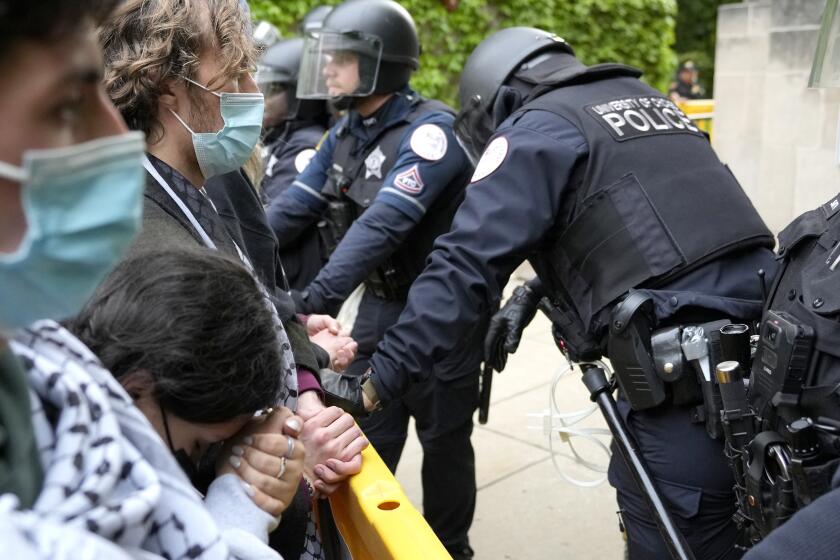Far Along Yet Far From Equal
Last month, we learned from the U.S. Department of Education how students in Los Angeles and eight other urban school districts across the nation scored on the highly regarded National Assessment of Educational Progress tests in math and reading. The overall results for the Los Angeles Unified School District were abysmal, even when compared only with scores of other troubled urban school systems. But the most appalling thing about the results was their confirmation that, 50 years after Brown vs. Board of Education, low-income African American and Latino students in the largest school district in California still receive radically inferior educations.
The federal test scores tell us whether students are reading or doing math at basic, proficient or advanced levels for their grade. In LAUSD, white fourth-graders are three times more likely than African American or Latino fourth-graders to be identified as “proficient” readers, while fully 70% of the district’s African American and Latino children cannot read at even a basic level. In math, the education gap in Los Angeles is even wider: White eighth-graders are 10 times more likely to be proficient in math than African American or Latino students, three-quarters of whom score at a “below basic” level. Compared to African American and Latino eighth-graders in all nine urban districts, Los Angeles students were dead last in math, with just 3% scoring at a proficient level.
Given what we know of the conditions in the schools attended by poor, nonwhite students, we should not be surprised at these results. Poor test scores mirror precisely the dramatic inequalities in educational opportunity at our schools. Take the issue of teacher quality: There is little doubt that well-prepared teachers are critical to a child’s education. Yet African American and Latino elementary school students in the district are nearly three times more likely to be taught by a teacher lacking a full credential.
One reason the district has difficulty attracting experienced teachers to schools attended by students of color is that the conditions in these schools -- for both students and teachers -- are strikingly worse. Elementary schools with the highest concentrations of Latinos and African Americans are nearly three times more likely than other schools to meet the state’s definition of “critically overcrowded” schools. In LAUSD, nearly half the middle schools serving students of color are so overcrowded that they have been placed on a year-round, multitrack “Concept 6” schedule that offers 17 fewer days of instruction each year than schools not on such a schedule. By contrast, not one of the district middle schools with the most white students operates on a Concept 6 schedule.
On Sept. 10, while running for governor, Arnold Schwarzenegger promised that if he were elected, he would work to provide equal educational opportunities for all children, and to ensure that inner-city schools got the most-qualified teachers. The recent Los Angeles test scores present both a challenge and a historic opportunity for the new governor and his administration. The scores illuminate the lost opportunity for another generation of children. They also provide a stark warning about the future of California. California’s economy, as well as its civic institutions, depends on an educated citizenry. We simply cannot fail to educate a large percentage of our children and survive as a decent and economically viable society.
If there is a reason for cautious optimism about all this, it is that after he was elected governor, Schwarzenegger chose as secretary of education a man deeply familiar with the schools of Los Angeles, a man who has demonstrated his commitment to helping low-income minority children succeed in school. That man, former Los Angeles Mayor Richard Riordan, now effectively presides over the largest public school system in America. At the same press conference at which the governor announced his goals for education, Riordan said of Schwarzenegger, “Arnold believes more than any human being I’ve ever met that every child deserves the tools ... of a quality education.”
Half a century after the U.S. Supreme Court’s decision in Brown vs. Board of Education, both the governor and Riordan have a historic opportunity to make good not only on campaign promises but also Brown’s promise that education must be “available to all on equal terms.”
More to Read
Start your day right
Sign up for Essential California for news, features and recommendations from the L.A. Times and beyond in your inbox six days a week.
You may occasionally receive promotional content from the Los Angeles Times.






